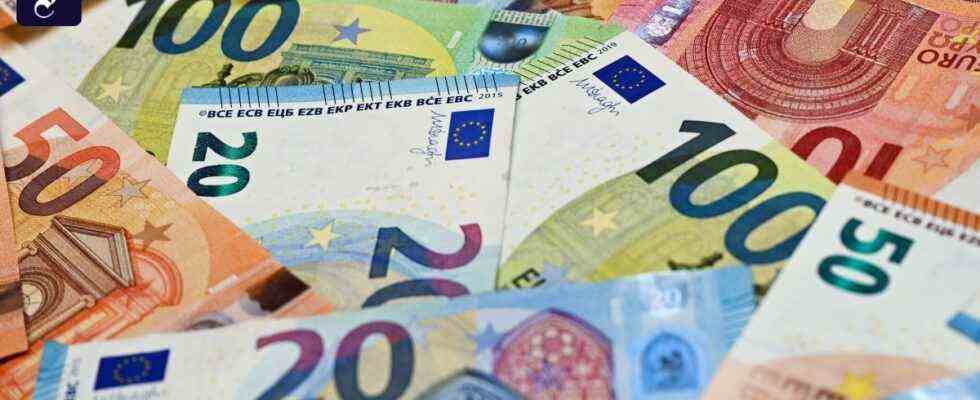Die inflation in the euro zone stays high. As the European statistical office Eurostat announced on Wednesday after an initial estimate, the inflation rate in January at 5.1 percent. In December it was 5 percent. That was the highest value since 1997. Energy in particular continued to rise sharply, but so did food and services.
Many economists had previously expected a noticeable drop in inflation at the turn of the year. That had already turned out to be wrong for Germany. In particular, the sharp rise in energy prices had offset other inflation-reducing effects. At the turn of the year, the consequences of the temporary reduction in VAT in Germany were no longer included in the inflation measurement. However, the price of CO2 on fuel and heating fuels rose. And the Ukraine conflict, among other things, has recently caused rising oil and gas prices. On Wednesday, the price of Super E10 at gas stations also reached its highest level in history.
Jörg Kramer, Commerzbank’s chief economist, commented: “At 5.1 percent, inflation in January is miles above the 4.1 percent forecast by the ECB for the first quarter. The unexpectedly high rate of inflation is a blow to the ECB’s neck. It should finally recognize the massively increased inflation risks and take its foot off the gas in terms of monetary policy.”
Large differences depending on the euro country
Depending on the euro country, there are considerable differences in inflation, even in the federal states in Germany prices are not rising at the same rate everywhere. Overall inflation in Germany in January was 4.9 percent according to the national method of calculating the consumer price index (CPI), and 5.1 percent according to the European method of calculating the harmonized index of consumer prices (HICP). Inflation rose in Hesse, while it fell in Saarland, for example. In the Baltic States, on the other hand, there are already two-digit inflation rates. ECB chief economist Philip Lane tried to calm things down with an interview last week. He continues to consider inflation to be “transitional”, i.e. only temporary.
The figures for North Rhine-Westphalia, for example, show how the prices of individual products have recently developed. Heating oil continued to rise particularly sharply, the price rose by 35.6 percent compared to the same month last year, electricity was 17.1 percent more expensive, diesel 26.1 percent and petrol 21 percent. Prices for vegetables (9.3 percent), dairy products (6.4 percent) and bread (6.1 percent) also rose, as did meat, fish and fruit.
Looking at the main components of euro area inflation, energy is expected to show the highest annual rate in January (28.6 percent, compared to 25.9 percent in December), followed by food, alcohol and tobacco” (3.6 percent, vs. 3.2 percent in December), services (2.4 percent, unchanged from December) and non-energy industrial goods (2.3%, vs. 2.9% in December).
What is the ECB doing on Thursday?
The Governing Council of the ECB meets on Thursday for its monetary policy meeting. He must discuss how the central bank should react to the increased inflation rates. One should probably not expect too much. The central bank will not raise interest rates, and an immediate halt to its bond purchases is unlikely. New inflation forecasts by the ECB economists, which will be higher, will not be available until the March meeting. Nevertheless, the debates are likely to be exciting: The inflation figures for Germany show that inflation at the turn of the year did not fall as sharply as many had expected.
In the Governing Council, the doves, the advocates of loose monetary policy, and the hawks, the advocates of tighter monetary policy, are struggling to find the appropriate response. It could be interesting whether ECB President Christine Lagarde is already changing its formulations in order to prepare for future reactions. Michael Schubert, ECB observer at Commerzbank, believes it is likely that the cautious course from the December meeting will be maintained in principle – but that Lagarde will try to keep the critics in the ECB Council, who are becoming louder, but also from outside keep.
In her remarks, Lagarde could emphasize the “flexibility and data dependency” in the further reaction to inflation. She could also emphasize that the current great uncertainty suggests waiting: Among other things, because of Omicron and the geopolitical risks surrounding Ukraine, the ECB needs more evidence before tightening its course further. Last but not least, she could highlight differences to the United States, where the Fed wants to raise interest rates soon.
The economist Rüdiger Bachmann said in an interview with the FAZ, he now thinks scaremongering is just as wrong as belittling inflation. The sticking point is that it is not yet clear whether inflation is only temporarily so high, said Bachmann: “We have a situation of great uncertainty on this issue.”
He therefore thinks it is wrong when some German economics professors now say that inflation has long been uncontrollable. “Like ketchup that’s out of the bottle and you can’t get it in there anymore, that’s nonsense.” But he thinks it’s just as wrong to deny or downplay the inflation risks that actually exist: “I have the impression that although not the European The central bank does that itself, but some left-wing economists who want to protect it do so.”

